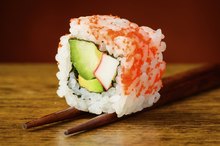Nutritional Information for Seaweed Wraps
Many Westerners would claim to not even think about eating seaweed, until you remind them of sushi. The crisp, brown wrapper of sushi rolls, which often appears as a strip around nigiri sushi, is made from dried seaweed. Because seaweed spends its life cycle submersed in the ocean, these light sheets of plant contain a surprising amount of mineral nutrition.
Serving Size & Calories
A single sheet of seaweed wrap weighs about 1 oz. Such a sheet contains about 85 calories, according to the "USDA Nutrient Database for Standard Reference." Of those calories, less than one comes from fat 1. Eighty come from carbohydrates and the remaining four come from protein.
- A single sheet of seaweed wrap weighs about 1 oz.
- Of those calories, less than one comes from fat 1.
Carbohydrate Information
Nutrition Information For Brown Rice Sushi
Learn More
There are 22 g of total carbohydrate in a typical serving of seaweed wrap. These carbohydrates are almost entirely complex carbohydrates. Complex carbohydrates, as opposed to simple carbohydrates like starches and sugars, are healthy for you. They break down slowly and provide you with long lasting energy with no following sugar low. Note that the white rice often served with seaweed wraps is just the opposite, containing almost entirely refined, simple carbohydrates.
- There are 22 g of total carbohydrate in a typical serving of seaweed wrap.
- Note that the white rice often served with seaweed wraps is just the opposite, containing almost entirely refined, simple carbohydrates.
Fat Content
Seaweed wraps contain no appreciable amount of fats, about 1/10 of 1 g per sheet. They will have little effect on your blood cholesterol level, though the fish traditionally served with them will be rich in fats and fatty acids.
Protein Information
Nutritional Information for the California Roll
Learn More
A serving of seaweed wrap contains just under 2 g of protein, about 3 percent of your USDA recommended daily value. Because the protein comes from plants, it is an incomplete protein. That means it contains only some of the eight essential amino acids your body needs for tissue health but cannot produce on its own. To get a complete protein, you should also eat complementary foods — like the bean curds and soy beans that accompany a traditional sushi meal.
- A serving of seaweed wrap contains just under 2 g of protein, about 3 percent of your USDA recommended daily value.
- To get a complete protein, you should also eat complementary foods — like the bean curds and soy beans that accompany a traditional sushi meal.
Nutrients
A single seaweed wrap contains 60 percent of your daily manganese, 54 percent of your magnesium, 41 percent of your folate and 33 percent of your iron. It contains smaller, but still significant, amounts of vitamins E, K and B-6, riboflavin, calcium, potassium, zinc and copper. The seaweed itself contains just 1 percent of your daily allowance for sodium, but many commercially-produced versions have added salt. Check the product packaging to confirm the sodium content of a particular wrap.
- A single seaweed wrap contains 60 percent of your daily manganese, 54 percent of your magnesium, 41 percent of your folate and 33 percent of your iron.
- The seaweed itself contains just 1 percent of your daily allowance for sodium, but many commercially-produced versions have added salt.
Related Articles
References
- USDA: National Nutrient Database for Standard Reference
- "Eat, Drink and Be Healthy"; Dr. Walter Willett; 2004
- "Wake Up Little Sushi"; Good Eats; Season 9, Episode 6
- Seaweed, wakame, raw. FoodData Central. U.S. Department of Agriculture. Published April 1, 2019.
- Luthuli S, Wu S, Cheng Y, Zheng X, Wu M, Tong H. Therapeutic effects of fucoidan: A review on recent studies. Mar Drugs. 2019;17(9). doi:10.3390/md17090487
- Cherry P, O'Hara C, Magee PJ, Mcsorley EM, Allsopp PJ. Risks and benefits of consuming edible seaweeds. Nutr Rev. 2019;77(5):307-329. doi:10.1093/nutrit/nuy066
- Kim EK, Ju SY. Asthma and dietary intake of fish, seaweeds, and fatty acids in Korean adults. Nutrients. 2019;11(9). doi:10.3390/nu11092187
- Fidelis GP, Silva CHF, Nobre LTDB, Medeiros VP, Rocha HAO, Costa LS. Antioxidant fucoidans obtained from tropical seaweed protect pre-osteoblastic cells from hydrogen peroxide-induced damage. Mar Drugs. 2019;17(9). doi:10.3390/md17090506
- Barone J. 6 Things to Know About Seaweed. Berkeley Wellness, University of California. Updated 2016.
- Folate: Fact Sheet for Health Professionals. National Institutes of Health, Office of Dietary Supplements. Updated 2020.
- Shellfish and Fish Allergy. British Society for Allergy and Clinical Immunology. Updated 2012.
- Vitamin K: Fact Sheet for Health Professionals. National Institutes of Health, Office of Dietary Supplements. Updated 2020.
- Seaweeds Used as Human Food. Food and Agriculture Organization of the United Nations.
Writer Bio
Jake Wayne has written professionally for more than 12 years, including assignments in business writing, national magazines and book-length projects. He has a psychology degree from the University of Oregon and black belts in three martial arts.









